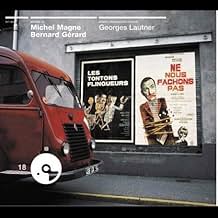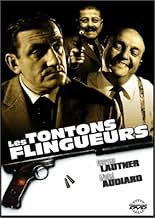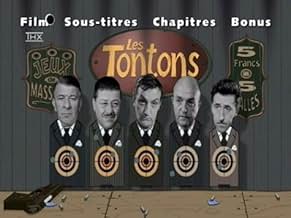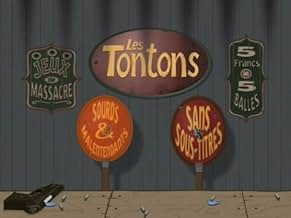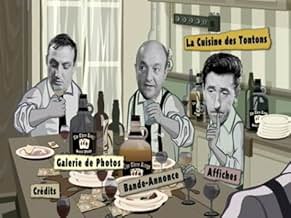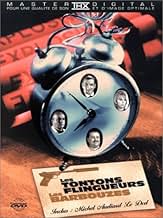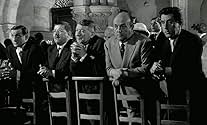A dying mob boss hands over his business to an old friend, Fernand. The boss' assistants want to get rid of the latter. But are the Volfoni brothers and Théo real threats? Ensuing fights and... Read allA dying mob boss hands over his business to an old friend, Fernand. The boss' assistants want to get rid of the latter. But are the Volfoni brothers and Théo real threats? Ensuing fights and shootouts are more comical than deadly.A dying mob boss hands over his business to an old friend, Fernand. The boss' assistants want to get rid of the latter. But are the Volfoni brothers and Théo real threats? Ensuing fights and shootouts are more comical than deadly.
- Awards
- 1 nomination
- Director
- Writers
- All cast & crew
- Production, box office & more at IMDbPro
Storyline
Did you know
- TriviaPaul Meurisse: The guy with the monocle saluting Lino Ventura at the end of the movie is Paul Meurisse, a reference to the movie The Black Monocle (1961), also by Georges Lautner.
- GoofsWhen punched by Lino Ventura, the wall against which Freddy falls buckles. Georges Lautner points this out in the director's commentary.
- Quotes
Raoul Volfoni: - Bougez pas !... Les mains sur la table ! Je vous préviens qu'on a la puissance de feu d'un croiseur, et des flingues de concours.
Jean: - Si ces messieurs veulent bien me les confier...
- ConnectionsFeatured in L'invité surprise (1989)
If you're a fan of classic Warner-era gangster movies, of Tarantino before he imitated Scorsese imitating Spielberg, if you adore Jean-Pierre Melville and abhor the so-called New-Wave -this celebration of existential boredom committed by a privileged group of elitist onanists, defined as the new standard of the silver screen- "Monsieur Gangster" and his gang of buffers to please all the movie buffs, is tailor-made for you. So welcome to that exclusive clan! (Yes, that sounds like elitism but it's a reverse one, one that takes its stuff seriously enough not to take it seriously, even through the lousiest comical devices and comedic vices, just for the sake of a male-bonding good time).
"Fatheads dare everything, that's even how we recognize them" the line exceeded the film and became a real-life proverb, proved right all throughout the film, with this joyful gang of fatheads, questioning the authority of their new leader: Fernand Naudin, played by Lino Ventura in his comical break-through role. The film starts when Naudin leaves his provincial tractor's shops to meet an old friend, known as the "Mexican". He finds "The Mexican" in a deathbed and one last request: the poisoned gift that will give the film its irresistible spice: Naudin must take care of his business, including his daughter. Naudin soon starts wondering which of the racket, not-so legal, or the girl, not-so angelic, is the most insufferable.
However, we know Naudin is a man of his word not to the former lieutenants' pleasure, "you didn't take that seriously" asked one of them, "let's say I was wrong" dryly retorts Naudin. The cards are set, the antagonists are the Volfoni brothers Raoul and Paul, played by Bernard Blier, one of the most defining faces of French popular cinema, an actor whose presence enhanced every type of personality, and the droopy-eyed Jean Lefebvre, a sure value in the lovable losers' department. But he's the one who frontally threatens Naudin : "you prepare yourself for sleepless nights, migraines, nervous breakdowns as they say", the last one is said in English with a delightful French accent, only rivaled by Naudin's butler played by the Jean Gabin (literally) of characters actors: Robert Dalban.
To complete this irresistible ensemble, there is Maitre Folace, a meek and polite lawyer played by Francis Blanche, eager to protect his master's interest no matter what. His "don't touch the money, you bitch" outburst, with tickling eyes betraying a menacing nervousness, followed by a shot on Blier and Ventura, staring at the "bitch" as if their eyes pointed guns is one of the film's most hilarious moments, proving that none is to be underestimated. Yet Raoul spends half the time being punched in the face by Naudin (the film's trademark, always followed by catchy banjo music) and the other half stating that he won't take it anymore. The villains are so laughable that the film needed a German killer to keep a cloud of danger floating on Naudin's solidly-built shoulders, but it never distracts from the comedy.
The film was directed by George Lautner, who signed one of the most memorable French gangster films (including "The Professional") but it's mostly praised for its writing by Michel Audiard, the street-wise dialog-expert who gave an indelible magic poetry to Parisian slang, making him the Rimbaud of Vulgarity. Audiard is probably the most likely writer to be lost into translation, hence my fear that subtitles might kill the experience of "Monsieur Gangster", if only for the little bits in English uttered by the scene-stealing butler. Still, it's impossible to resist the dialogues, whose charm transcended generations and became catchphrases in French Pop-Culture. In one of Audiard's other written films, a woman wants to go to Rio with her boyfriend, "We don't bring sausages when we go to Frankfurt" is his laconic reply.
That's the Audiard touch; it's a man's world, made of acid dialogues and muscular confrontations. The film does lose its pace at parts, the girl, the German gangster, the soon-to-be son-in-law, played by Claude Rich, suffer by comparison with the glorious cast, but the film is redeemed by some brilliant pieces of acting and writing, immortalized in the mythical kitchen scene when the four men challenge themselves to drink one tough liquor. Lino Ventura feared that scene because he would challenge other actors used to comedy... well, the look on his face after the first drop probably cleared his doubts. Watching these four giants, speaking of alcohol, money and women is indeed the highlight of the film. And I learned that after the shooting, Ventura came back home and told his wife "we finally made it!" and from his relief, it didn't feel as they've been drinking chamomile.
Surprisingly, the film met with poor reception, abandoned by a youth, brainwashed by the Cinema's Cahiers and the Nouvelle Vague, before they realized the Emperor was as naked as Brigitte Bardot in any film she did. And if "Monsieur Gangster" was loathed by the critics, today, it's an indisputable classic of French cinema, all it took was Audiard's writing and French actors with talent as huge as their noses. A breed of men that can only invite for a sorrowed observation : "they don't make like this anymore"
So, if subtleties in subtitles, 'bang bang' in slang and Frenchy frenzy give you allergy, "Monsieur Gangster" might not be the wisest choice, no sir. This is one hell of an evening, so froggy it'll leave you groggy.
- ElMaruecan82
- Sep 10, 2013
- Permalink
- How long is Crooks in Clover?Powered by Alexa
Details
- Release date
- Countries of origin
- Languages
- Also known as
- Les Tontons Flingueurs
- Filming locations
- Route de Coligny, Saint-Germain-en-Laye, Yvelines, France(shootout at Tomate's gambling circle)
- Production companies
- See more company credits at IMDbPro
- Runtime1 hour 45 minutes
- Color
- Sound mix
- Aspect ratio
- 1.66 : 1
Contribute to this page


![Watch Bande-annonce [OV]](https://m.media-amazon.com/images/M/MV5BZmNmMTNiZjItMDlmYy00ZWY4LWE4YWMtYzM0NTRhZjdhMGU4XkEyXkFqcGdeQXRyYW5zY29kZS13b3JrZmxvdw@@._V1_QL75_UX500_CR0)

